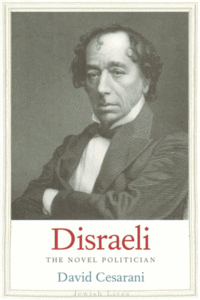Disraeli: The Novel Politician, by David Cesarani, Yale, 304 pages, $25
Reviewed by NEAL GENDLER
If ever a Jew was conflicted and ambivalent about his people, it was Benjamin Disraeli.
Baptized as a child and professing Christianity, Queen Victoria’s favorite but widely despised prime minister never denied his Jewish birth, but his writings showed scant knowledge of Jewish life and religion.

What he wrote about Jews ranged from arrogant claims of superiority to vile slanders worthy of Joseph Goebbels.
Thanks to his father, Isaac D’Israeli, Benjamin “was infused with a contempt for traditional Judaism and taught to think of Christianity as its worthier successor,” says acclaimed British historian David Cesarani. “While Jewish history offered vignettes that illustrated certain virtues, there was otherwise nothing of value in his Jewish heritage.”
In cleverly named Disraeli, The Novel Politician, Yale’s newest Jewish Lives biography, Cesarani — who died last October at 58 — explores the twists that brought an ambitious, attractive, flamboyant outsider to the pinnacle of elected power in the world’s mightiest nation.
Critics scorned Disraeli for his Jewish birth, flashy clothing, fame as a romance-adventure novelist, and notoriety as young womanizer and nearly lifelong debtor.
Cesarani’s dispassionate biography touches the politics and social problems of mid-19th century Britain. It’s interesting and written clearly — only a few professorial words — but at a level demanding close attention.
Considering Conservative Disraeli’s reputation for rapier wit and florid oratory, and the legendary loathing between him and tart-tongued Liberal leader William Gladstone, I would have liked more quotation, or at least a description like this one from the BBC website: “Their style of debate was as different as their personalities — Gladstone torrential, eloquent, evangelical, vehement and ‘preachy’; Disraeli, urbane, witty and worldly, with a streak of romance as well as cynicism.”
I’d also like to know when the apostrophe disappeared from D’Israeli and why Yale didn’t spend more to give this worthy book some visual appeal from drawings or photos.
Of Sephardic heritage, Disraeli was born at home in a respectable London district, in 1804, and had a brit mila (ritual circumcision). His grandfather, also Benjamin, was from a northern Italian town’s ghetto, although the future prime minister often invented loftier beginnings. Isaac had his children baptized, not uncommon then as a route to social and economic advancement.
Disraeli stood for office four times until elected in 1837, slowly gaining influence in a party upholding advantage for the wealthy. Cesarani says that while advocating equal rights for all religions and arguing for Jews’ admission to Parliament — a Christian oath kept repeatedly elected Lionel de Rothschild out for years — Disraeli “never took a stand on the issue of general prejudice against Jews.”
The 1840 Damascus Affair, in which Jews were accused of ritual murder, caused an uproar in Britain but elicited not a peep from Disraeli, Cesarani says.
In 1839, Disraeli married Mary Ann Lewis, a lasting bond sanctified in a church with none of his family present. He continued writing, which didn’t boost his standing among rich lawmaker colleagues. But he needed the money; he was being kept afloat by friends including Rothschild.
As Chancellor of the Exchequer despite no qualifications “except, perhaps, dodging creditors,” his personalized reports endeared him to Queen Victoria. He became prime minister in 1868. His greatest triumph was passage of a voting-expansion bill that soon put the Liberals in power. Prime minister again in 1874, he was pressured by Victoria to uphold British power during a Balkan rebellion supported by Russia against Turkish rule.
Disraeli’s opponents claimed he was usurping Parliament’s power and favoring war, but his diplomacy and movement of British warships attained Britain’s objectives in the 1878 Congress of Berlin without firing a shot. Critics soon claimed he’d supported Turkey against Russia because his Jewish birth allied him with Muslims against Europe’s Christians.
“The construction of Disraeli as a ‘Jew’ carrying out a ‘Hebrew policy’ was the enduring legacy of his last period in office,” Cesarani says. As Lord Beaconsfield, “he ended his days buffeted by a tempest of anti-Jewish vitriol.” Dying in 1881, “Disraeli, who had begun life as a Jew, ended it as ‘the Jew.’”
***
Neal Gendler is a Minneapolis writer and editor


















